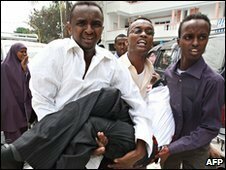 (RTTNews)Â -Â Somali Information Minister Dahir Gelle said Thursday that the suicide bomber who killed over 20 people attending a graduation ceremony in the capital city of Mogadishu last week was a Danish citizen of Somali descent.
(RTTNews)Â -Â Somali Information Minister Dahir Gelle said Thursday that the suicide bomber who killed over 20 people attending a graduation ceremony in the capital city of Mogadishu last week was a Danish citizen of Somali descent.
Gelle said that investigations revealed that the suicide bomber was a 26-year-old Somali man named Abdurrahman, who had been living in Denmark for a long period of time before returning to Somalia in mid-June 2008. The minister added that the bomber’s father identified him from the photographs released after the incident.
At least 22 people were killed last Thursday when the suicide bomber blew himself up at a graduation ceremony in Mogadishu. The victims of the attack were mostly medical students, and also included three government ministers. Some 60 others were also injured in the attack.
Though officials believe that al-Shabaab, the military wing of the Islamist movement ousted by Ethiopian army-backed Somali forces two years ago was responsible for the attack, the militant group has issued a statement denying any involvement in the suicide bombing.
Earlier in the week, hundreds of Somalis staged a massive demonstration in Mogadishu on Monday, protesting against the al-Shabaab Islamist militant group believed to be responsible for last week’s suicide attack.
The protestors burned the flag of the militant group, marking the first public show of anger at the militant group that controls most of Somalia. Media reports indicated that most participants in the rally were relatives of the students killed or injured in the bombing.
Al-Shabaab militants, along with other allied Islamist insurgent outfits, control large areas in southern Somalia, where they enforce strict Islamic law or the Sharia. Currently, the group is engaged in fierce fighting with the rival Hisbul-Islam group for the control of the southern port city of Kismayo.
The two rival Islamist groups were united until recently in their fight against the forces of Somalia’s interim government and the AU peacekeeping troops. Jointly, the two control most of the Somalia’s southern and central areas. The recent power-struggle between the two groups have raised concerns that the fighting might spread to other areas jointly controlled by them.
Al-Shabaab and several other allied militants groups have opposed past UN-sponsored reconciliation efforts in Somalia, insisting that they will negotiate with the country’s UN-backed transitional government only after the AU peacekeeping mission leaves Somalia.Somalia has not had a functioning government after the fall of the last government in 1991. Currently, a weak UN-backed interim government is trying to enforce its authority in the country. The fighting between Islamist insurgents and the government security forces has killed thousands of Somalis and displaced hundreds of thousands more, mostly from Mogadishu.
Presently, a 4,300-member AU force is struggling with peacekeeping efforts in Somalia after the militants turned to guerrilla warfare against the government and AU troops. So far only Uganda and Burundi have contributed troops to the AU peacekeeping force, which was initially planned with a strength of over 8,000.
by RTT Staff Writer



